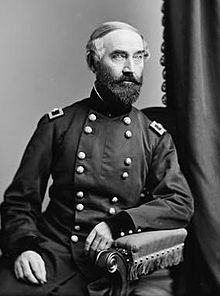George Washington Cullum
| George Washington Cullum | |
|---|---|

George Washington Cullum
|
|
| Born |
February 25, 1809 New York City, New York |
| Died | February 28, 1892 (aged 83) New York City, New York |
| Place of burial | Green-Wood Cemetery, Brooklyn, New York |
| Allegiance |
United States of America Union |
| Service/branch |
United States Army Union Army |
| Years of service | 1833–1874 |
| Rank |
|
| Unit | Corps of Engineers |
| Commands held | United States Military Academy |
| Battles/wars | American Civil War |
| Awards | Cullum Geographical Medal (establisher) |
| Other work | Author |
George Washington Cullum (February 25, 1809 – February 28, 1892) was an American soldier, engineer and writer. He served as a general in the Union Army during the American Civil War, primarily serving in the Western Theater. Cullum also served as the 16th Superintendent of the United States Military Academy.
Cullum was born in New York City, but was raised in Meadville, Pennsylvania. He graduated from the United States Military Academy, ranking third in the Class of 1833. He designed the Independent Congregational Church at Meadville and it was built in 1835–1836. He joined the Corps of Engineers and supervised a number of construction projects on the East Coast. Cullum served as the engineer in charge of the construction of Fort Trumbull in New London, Connecticut. He was promoted to captain in 1838 and held this rank until the outbreak of the civil war. He was an instructor of engineering at West Point from 1848 to 1855, and published the forerunner of his Biographical Register in 1850. Cullum took two years leave of absence for health reasons, and traveled throughout Europe, Asia, Africa and the West Indies while recuperating.
From April 1861 Cullum was a lieutenant colonel and aide-de-camp to General Winfield Scott, before becoming chief engineer of the Department of the Missouri in November 1861. He was appointed brigadier general of volunteers to rank from November 1, 1861 on November 12, 1861 but President Lincoln had to submit the nomination four times before the U.S. Senate finally confirmed it on March 11, 1863. He later superintended engineering works on the Western rivers and was chief engineer at the Siege of Corinth. He was superintendent of the military academy from 1864 to 1866. On March 8, 1866, President Andrew Johnson nominated Cullum to be appointed to the grade of brevet major general, USA, to rank from March 1866, and the U.S. Senate confirmed the award on May 4, 1866 and reconfirmed it July 14, 1866 after the dates of rank of staff officers were adjusted to follow those of field officers. He was mustered out of the volunteers on September 1, 1866.
...
Wikipedia
